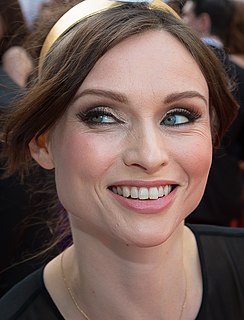A Quote by Sophie Ellis-Bextor
Related Quotes
When you play a smaller, more intimate venue, you can have real conversations with your audience, take risks, and stay current. You can also change the set list, on how the day feels or how the audience reacts. When you do arena shows, every arena looks and feels the same. You can't see who is in the room.
I have read a thousand screenplays, and I have acted in a handful of them, and I have felt when it feels good, the writing, and it feels natural, and feels funny or sad or honest or whatever it may be. You connect. And I felt when it feels like writing, when it feels stale, or when it feels artificial or forced, or too theatrical or whatever.
Generally, the imagery and the text go hand in hand. It's much easier when the text comes first, but sometimes I need visual stimulation in order to find the words. I get an idea of what I want when I begin to shoot, and the text is usually the last thing to be resolved. I tend to leave the text open, and I refine the words up to the last minute. As for the image, I can resolve that and get that done fairly quickly.
Well, feel this, why don't you? Feel how it feels to have a bed to sleep in and somebody there not worrying you to death about what you got to do each day to deserve it. Feel how that feels. And if that don't get it, feel how it feels to be a colored woman roaming the roads with anything God made liable to jump on you. Feel that.
With Orff it is text, text, text - the music always subordinate. Not so with me. In 'Magnificat,' the text is important, but in some places I'm writing just music and not caring about text. Sometimes I'm using extremely complicated polyphony where the text is completely buried. So no, I am not another Orff, and I'm not primitive.
I began as a dramatist in the theater, so I'm always thinking about how a story moves, what it looks like, how to engage the senses, how dialogue sounds, what feels authentic and sounds real, what's funny, how to build distinctive and original characters - all the aspects of playwriting, scene-building, the architecture of dramatizing.
I think, as a comedian, the funniest you can be is with people you know, and [whom] you've known for years, in a pub. That's as funny as you get, and so the aim [while stand-up] is to get that funny on stage with 5,000 strangers, to get that funny in a room where people shouldn't be listening but they are.




































